High Times with Aspen’s Cannabis Kingpin
Jordan Lewis runs the ritziest pot store in the country: Aspen, Colorado's Silverpeak Apothecary, where sommelier-like "budtenders" sell gourmet ganja in a designer showroom. But soon after he arrived, he found himself under siege from locals worried about that skunky smell wafting over their mountain valley. It's enough to drive a man to toke.
New perk: Easily find new routes and hidden gems, upcoming running events, and more near you. Your weekly Local Running Newsletter has everything you need to lace up! .
is the only cannabis shop in Aspen, and probably all of Colorado—perhaps the world—where a 74-year-old, four-foot-eleven, bespectacled Jewish grandmother greets you at the door. “I’ll show you around,” Ellen Haas cooed last September as I entered the shop on East Cooper Avenue, hidden below street level, near a Rolex retailer, a Ralph Lauren boutique, and a Lululemon store. A retired fashion designer, Haas first ventured into Silverpeak to seek relief for her rheumatoid arthritis. “I educate people now,” she told me, clutching my arm with surprising strength.
I looked around the 1,500-square-foot space, where expensive lighting fixtures warmly illuminated a range of marijuana products set out on recessed shelves. With its white brick walls and two-tone wood finishings, Silverpeak has been compared to an Apple Store and a Tiffany’s. I found myself tucking in my shirt. A handmade mahogany and sycamore stash box called the Alchemist ($2,250) sat on a midcentury-modern table. Copies of Michael Pollan’s The Botany of Desire were lined up on a shelf, and beautiful photo collections—landscapes in rural Uruguay, life in California’s cannabis-growing communities—decorated glass tables. String music played. From a window in the back, where the supply is kept, employees pushed out silver trays bearing vials of cannabis with names like Space Queen, Death Star, and Granddaddy Purps. Budtenders, as experts at the counter are called, presented the product with the hushed gravitas of sommeliers to buttoned-down customers who did not look like they’d be going home to drop a needle onto The Dark Side of the Moon.
“We’ll start with edibles,” Haas said. “Ten milligrams is the suggested dosage, but if somebody has never done any, I recommend five. It takes an hour or two to kick in. You’ve got to have patience. Some people take more than they should, and that’s bad. I had too much once. All of a sudden you feel your heart racing, the room goes around, and you have to lie down.”
I knew what she meant. I first tried Silverpeak’s edibles in early 2014—just a few gummies one afternoon. Nothing seemed to happen, so after an hour I ate more. I’ll spare you the entire nightmare that followed, but the climax was dinner that night at a fancy restaurant called Element 47. Shortly after sitting down, I noticed a jar of chocolates in the middle of the table that, my companion informed me once I’d put them in my mouth, were rocks. I ran back to my hotel, locked the door, called my girlfriend, and assumed the fetal position until morning.
“I’ve been there,” said Haas, patting me on the back.
She pointed out the shop’s Chill Pills, mints, brownies, Zoom Balls, gummies, and Cheeba Chews, then we moved on to other modes of ingestion. “I prefer smoking with a little chillum—you know, a glass bat—or rolling a joint,” she said. “Then we have the oil. Cartridge pens are a fabulous way to smoke. There’s no odor. The garbage is vaped away, so nothing bad goes into your lungs.”
“This issue is our generation's civil rights movement, along with gay marriage,” Lewis said. “It's not really about getting high, it's about letting people use this plant responsibly.”
I asked what question she gets the most. “Older gentlemen,” she whispered, “ask what can help them sexually. I always say, ‘Try an indica.’ It’s relaxing, and I think that’s one of the issues. For women we have Foria, a coconut oil with THC,” the main psychoactive molecule in pot, which has a localized effect in this application. “It’s used on your external genitals; five sprays cause arousal in half an hour. The biggest treat is that the orgasms are stronger, and you can have them for quite a while!”
Just as I began to think that Haas was an undiscriminating saleswoman, she pointed to a little tube with a $12 sticker: “That’s called Lip Buzz. It’s silly.”
I thanked her and—after purchasing an ambitious quantity of cannabis to smoke over the next five days—headed for the door. From behind me, Haas called out: “Jordan is amazing!”
Jordan Lewis, the founder of Silverpeak, was waiting for me outside. A trim, youthful 43, he wore athletic shorts and trail runners and was neatly groomed, befitting his private-school upbringing in Manhattan. Among the many challenges he has faced as a marijuana businessman is being mistaken for a DEA agent.
“My landlord loves Peter Tosh,” Lewis said, pointing to a mural of the reggae legend painted just outside the building’s entrance. “As do I. But that wasn’t the image I was trying to cultivate here.” He shrugged.
Such is the take-what-we-can philosophy of legal cannabis entrepreneurs. Four states—Colorado, Oregon, Washington, and Alaska—plus the District of Columbia have legalized recreational marijuana, and almost half the country allows medical use. Market data is tough to capture, but Douglas Leighton, cofounder of Dutchess Capital, a hedge fund that has invested heavily in the industry, predicts that the legal pot market will grow to $8 billion by 2018. There are already more than 800 medical and retail shops in Colorado alone, and the state collected $67 million in tax dollars from an estimated $700 million in sales in 2014—greater than its tax revenue from alcohol.
Lewis has invested $10 million over the past six years to build Silverpeak into one of the most highly regarded boutique legal-marijuana brands in the country. One blog called it a “Willy Wonka weed wonderland,” but Lewis is more like a stoner version of Elon Musk, cultivating his product in state-of-the-art organic greenhouses half an hour downvalley, in the town of Basalt. To his patrons and his 70 employees, he is a pioneer. But to a contingent of angry locals, he’s a reckless pot pusher, poisoning their pristine mountain community with the pungent effluence of a large dope farm.
“This issue is our generation’s civil rights movement, along with gay marriage,” Lewis had told me before my visit. “It’s not really about getting high. It’s about ending this nonsense and hypocrisy and letting people use this plant responsibly. I wish everyone in the valley would let me do that.”
“My sweet utopia,” he wrote me in an e-mail a few months later, “has turned into a reality-T.V. show.”
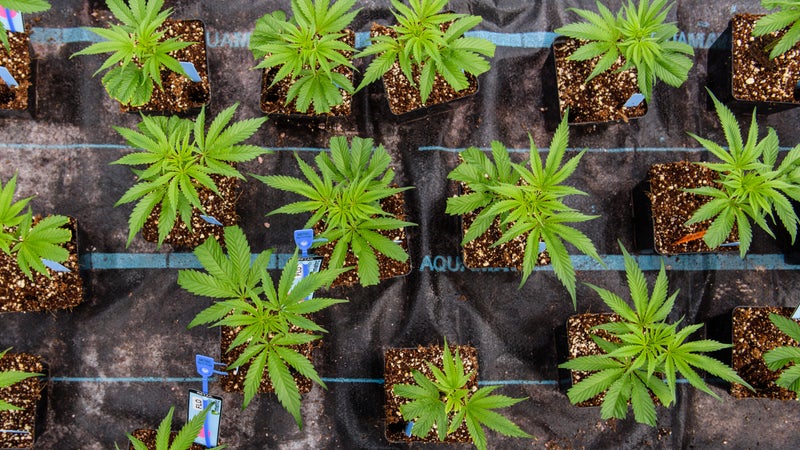
Good weed stinks. The great stuff? The stinkiest of all, if you ask Lewis’s neighbors in Basalt. They’ve been complaining loudly about the “breeding facility for skunks” he built next to the Roaring Fork River in a cluster of greenhouses along Highway 82, the main corridor traversing the Roaring Fork Valley. Basalt, some say, is Aspen for the rest of us: you can buy a home for under a million, shop at Whole Foods, and sip locally distilled vodka. The air here is just as fresh as that of its upvalley neighbor. Usually.
, which Lewis opened last winter after outgrowing a retrofitted prefab house in nearby Redstone, is a 25,000-square-foot hydroponic operation housing 6,000 cannabis plants in various stages of growth. By law, each one has been tagged with a government ID number. By practice they’re spread across four houses, so any biological threat isn’t likely to wipe them all out at once. Unlike conventional grows inside windowless warehouses using artificial light and tap water, High Valley Farms uses sunlight, fresh river water, mountain air, and helpful mites (instead of pesticides) to produce, at great expense, a product that Lewis believes is “the best in the industry.” (Most of Aspen’s six other pot shops grow their product in traditional warehouse spaces, mainly in Denver.) He doesn’t enter his weed in competitions like the because he’d rather “let the word spread organically.”
Lately, the wind has done most of the work for him.
Holland Hills is the small subdivision directly across the highway where most of the complaining neighbors live. “From the beginning,” Lewis told me, “a vocal minority there said we were going to destroy the neighborhood, bring cartels there, run over their dogs. One woman told my wife, ‘You’ll be responsible for the deaths of children.’ ”
“We don’t know what all these emissions could cause us,” a septuagenarian neighbor named Joan Mecseri told me last fall. “I’ve had these funny little headaches that I never used to have.” Mostly, though, a few dozen people just hate the smell. One summed it up this way last March: “When you step outside, it’s like you’re stepping into a bag of weed.”
Soon after High Valley Farms began growing plants, the website popped up. “This has nothing to do with the morality of marijuana,” the home page reads. “Break out the Pink Floyd and Ben & Jerry’s and enjoy. Just don’t inflict the smell of industrial skunk on your neighbors.” Within months angry residents had posted more than 200 comments.
When I first reached out to Lewis over the summer, he was having a rough time. A major proposal—partnering with Northwell Health to become a provider of medical marijuana for New York hospitals—had not come through. “It was a gut punch,” Lewis said. “Everybody around me had been saying, ‘You’re a shoe-in, you’re a shoe-in.’ You start believing it.” The money he’d made up to that point still couldn’t even be put in the bank. “I had a guy in his mid-thirties,” said Lewis, “with an MBA from Harvard—I called him Moneybags—and his job was to literally walk around and manage the cash pool all day. What a joke! But it’s necessary, because marijuana businesses can’t safely use federal banks.” By the time I arrived in September, his mood had improved. He’d spent $2 million—a good chunk of Silverpeak’s capital—to fix the skunk smell in advance of a critical hearing with the Pitkin County commissioners, who had threatened to revoke High Valley Farms’ business license at an earlier hearing in June.
“We were developing this hydroxyl solution, a neutralizing agent that had never been used this way,” Lewis told me, “and the Holland Hills people had a urologist from Johns Hopkins stand up and say a lot of ridiculous things about THC being airborne and dangerous. We knew we couldn’t assuage their concerns. We’d been working on that solution for months—we weren’t just spraying Febreze—but we scrapped it.”
The commission gave Lewis three and a half months to fix the smell. Lewis cold-called an odor-mitigation expert from the University of Cincinnati. “You don’t have an odor problem,” Rakesh Govind told him, “You have a math problem.” Lewis flew him to Aspen the next day. “It was just a design flaw,” Lewis explained. “When you force air in somebody’s direction, you’ve got to give it time to dissipate.” Govind reconfigured the airflow to expel more slowly and installed 88 new carbon filters, clustered in four banks, costing $600,000 before installation.
During the fight, bigger players in the nascent industry lent political support. Michael Brubeck, president of Centuria Natural Foods, the largest raw-cannabis importer and processor in the U.S., wrote a letter to the commissioners urging them to give Lewis a chance. “It is my belief that the work being done at High Valley Farms will save the state’s cannabis industry,” he stated. “It’s one year into a research program on the key issues that would normally be handled by a growers association,” like genetics, farming technologies, and costs. “It’s imperative that this research continues or there won’t be a Colorado cannabis industry in five years.”
�����ԹϺ��� I stood beside one of the carbon filters facing the river. From two feet away, I detected a faint weedy fragrance. Once I stepped back, it was gone. Lewis smiled warily: “Now if people smell it from across the street, it’s their problem.” The next hearing would take place in two days.
Before entering the facility, I had to hand over my driver’s license to a door guard and step into sterile booties. The greenhouses were immaculate. Lewis urged me to get down on my hands and knees. “Look around,” he said. There wasn’t a speck of dirt below the rows and rows of budding female plants, which Lewis inspected and caressed with great tenderness. Silverpeak chief operating officer Mike Woods calls High Valley Farms a botanical art gallery. Different strains of weed displayed different textures and colors, from deep forest greens to bright purples and highlights of tangerine.
“Beautiful, right?” said a young guy filling giant plastic bags with product. His face was paralyzed in a Cheshire cat grin.
“I don’t have a policy against being high on the job,” Lewis said.
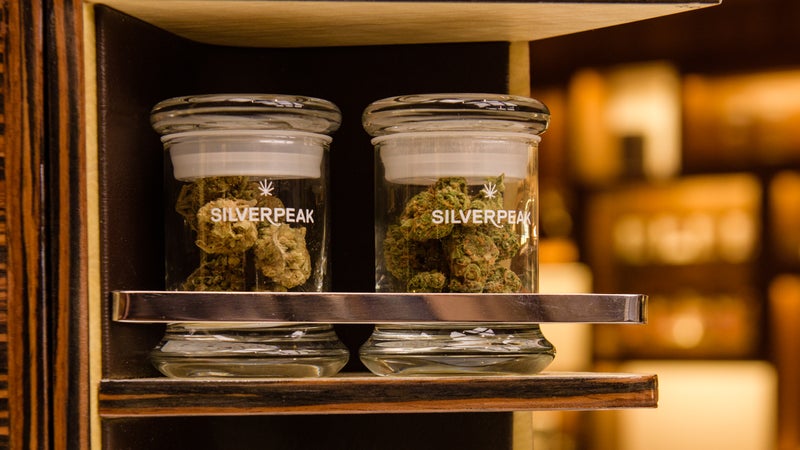
I spent a week in Aspen with six vials of Silverpeak cannabis staring at me from my bedside table. Dragon, a “giggly” sativa, in the parlance of reviewers, became my favorite. I found it uplifting and energizing: it made me want to go for a hike, which is what Lewis prefers to do when he smokes. (He also uses cannabis as a general stress reliever and as a sleep aid after his three young kids, ages three to eight, go to bed.) Death Star just knocked me out for ten hours straight, with my clothes and the television on.
I mostly smoked on my balcony at the Viceroy Snowmass, since it’s still illegal to light up in public. Like Ellen Haas, I used a little chillum. I looked out at the leaves in the afternoon and the hot-air balloons above the valley at dawn. I thought about a world in which using marijuana was tantamount to sipping craft beer. I thought about what I’d eat in town that night. And I thought about Lewis’s long, strange trip to becoming the cannabis king of Aspen.
He grew up in Manhattan in the eighties, the younger of two sons of real estate baron Stanley Lewis, whose holdings included a 34-story tower on the edge of Times Square that housed the Hotel Novotel, and Judith Lewis, who co-owned and operated nursing homes. The family lived in a sprawling ninth-floor apartment uptown, which Lewis described as “a dysfunctional house in the sky.” His father, Lewis said, offered high expectations but little affection: he hoped that one day his sons would manage the family’s portfolio. But Jordan, whose real loves were animals and agriculture—he discovered both on a farm in Pennsylvania when he was 12—had other ideas.
At Tufts, where he studied neuropsychology and began smoking a little pot in the early nineties, Lewis suffered from sometimes crippling depression. City life in Boston exacerbated his problem, so he took a semester abroad in the Turks and Caicos Islands and enrolled in a marine-biology program. “I was sitting on the beach one day with this student from UC Berkeley,” Lewis told me, “and he was explaining how he grew marijuana hydroponically. He picked up a stick and drew a basic system in the sand. As clear as yesterday, I remember the light going on: Holy shit, it’s so simple.”
Already fascinated with growing food, Lewis began educating himself on marijuana cultivation. He checked out books and subscribed to Growing Edge magazine, published by legendary Oregon grower Tom Alexander. During his junior year, he flew to California to attend a hydroponics convention in a Holiday Inn: ten guys, including Alexander, and a booth. “I go up to Alexander, who’s a folk hero to me,” Lewis said. “I was this clean-cut, preppy guy. And I was like, ‘Tom! Hey! What do you think about ebb and flood versus drip?’ And he’s like, ‘I cannot confirm nor deny…’ I said, ‘I flew all the way out here. You’re my hero and you won’t talk to me?’ The rest of them stonewalled me, too, thinking I was a cop.”
Growing marijuana became Lewis’s secret project. “Nobody taught me,” he said, “beyond that sand diagram and a few books.” He felt a moral necessity to not sell what he grew. “I never wanted to be a drug dealer. So I gave it away. I was pretty popular for that.”
I listened intently. My eyes felt wide open and focused. My heart beat a little faster than normal. The gold aspen leaves were stunning. Really stunning. Had Lewis brought any snacks?
Leaving Tufts one credit shy of graduating—“I said, Fuck it, I don’t need a degree”—Lewis kept growing back in New York, trying to improve his technique. At the same time, he was learning to fly small planes upstate and working for his dad. Real estate was the last thing he wanted to do. But he felt locked in when Stanley Lewis was diagnosed with leukemia in 1997. Soon, Lewis began to spend long days at Memorial Sloan Kettering Cancer Center.
“I was dealing with depression,” he said, “and I was watching these gravely ill people, the horrible effects of chemotherapy. Cannabis was the only thing helping my state of mind: it got me out of bed some mornings. And I realized, in talking to the nurses, it was the one thing helping a lot of patients, too.”
Quietly, he began giving patients cannabis. His father was one of the few who wouldn’t partake. “He died from chemo in 2000, not cancer,” Lewis said. “He went blind, incontinent. And that was the therapeutic treatment he’d chosen. He wouldn’t take the cannabis that I offered him, the one thing that would have helped his state of mind. It made no sense. He was wasting away. He was an extraordinarily controlling guy, the source of my rebellion. When he passed, that was the start of my adult life, at 27.” Lewis had spent three years caring for his father. “The sun came out,” he said.
Lewis and his brother were left in charge of the Times Square building. That’s when Lewis realized he could take his hobby to the next level—while flouting his father’s ghost. “I took over the subbasement,” he told me, “which was this dungeon. And I turned it into a marijuana grow. Right there beneath everybody’s nose.”
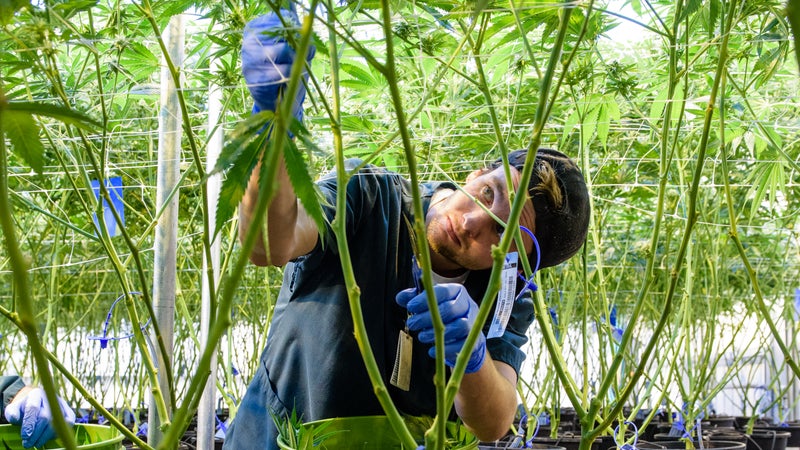
The basement took up the better part of a city block, but Lewis carved out a smaller workspace among the sewage ejector pumps and steam pipes. He brought in equipment at night, including a high-pressure-sodium lighting setup. The building used so much power, he reasoned, that this additional drain wouldn’t be detected. He also took postbaccalaureate classes in medicine at Columbia and began to volunteer one day a week at the Bronx Zoo.
“My brother, Mr. Big Shot, had an MBA and was focused on doing his thing from the penthouse corner office, where our father used to work,” Lewis said. “I was up there by day, but I was in the basement at night. A close friend and I would go down, and the smell of the plants got all over us. So we’d strip down to our underwear and work for a week straight, 12 to 14 hours at a time.” (While Lewis admitted he grew “a lot” of weed during this period, he wouldn’t discuss whether they ever sold any of it.)
In 2001, Lewis finished at Columbia, having also earned his BS at Tufts. But he still felt existentially tethered. “I don’t know if it was more ritual or ceremony or what,” he told me, “but what came next had to be a physical act. I had to fly around the world.” So he did, leaving his best friend in charge of the grow. Through the Bronx Zoo’s director of field operations, Lewis had learned that there was a need for bush pilots to help with conservation projects in Africa. Late that year, he headed over. “I remember landing in Kenya pretty much deaf, because I’d been in an airplane for weeks. My ears were ringing, and I was lying in this hut just laughing my ass off. That was the first moment I realized: Everything you think is reality is not. Almost everything I’d done was because I’d been pressured to do it. I needed to figure out my own desires.”
For two years, he bounced around Africa, conducting aerial tracking of poachers and radio-collared animals for Conservation International, Elephants Without Borders, and the Laikipia Predator Project in Kenya, Mozambique, Botswana, Sudan, Eritrea, and Djibouti. He felt free, finally. Then two of his best friends, both pilots, died in separate plane crashes, including the one who had helped him with the basement grow.
Set adrift, Lewis returned home to the U.S. to pursue a career as a wildlife veterinarian. He’d been accepted to the University of Pennsylvania’s veterinary school and moved to Philadelphia with his fiancée, Elizabeth Granger, whom he’d known since seventh grade. He left the basement operation in the hands of a close friend and eventually shut it down.
In the spring of 2009, Lewis was at a difficult crossroads: 36 years old, the holder of a veterinary degree, and the father of a baby boy. He couldn’t exactly take off for Africa and treat elephants. “I thought my hands were tied career-wise,” he said. “Then I had lunch with a friend who mentioned that marijuana laws were loosening in California.”
The light went on, just as it had with hydroponics. “I locked myself down for two months,” he said. He compiled the marijuana laws from every state. He called lawyers and accountants. And he narrowed his search down to two states where it would make sense to invest: Michigan and Colorado. He figured he’d start a small medical-marijuana business and then get back to veterinary work.
That July, Lewis was on a conference call, sitting in his car on 52nd Street, when the Colorado Department of Public Health and Environment rejected limitations on the distribution of medical marijuana, effectively approving dispensaries.
He and Granger booked a flight for Colorado the next day, visiting Boulder, Denver, Vail, and Steamboat Springs over a week and a half. “Then we got to Aspen,” Lewis said. “I’d only been once and always teased my wife: ‘I’ll never live in Aspen. Those fucking rich assholes.’ But this time it made sense. I was enamored with the beauty. I learned about the history and the law-enforcement mentality”—the longtime home of Hunter S. Thompson is known for lenient enforcement of drug laws—“and that sealed the deal. Pitkin County was a safe harbor.”
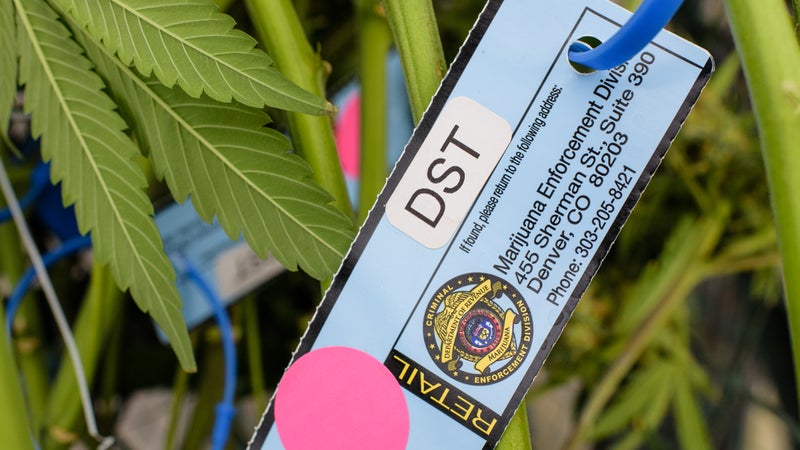
On the morning of the big county-commission hearing, I took a puff of Space Queen—a happy, heady sativa with notes of pineapple—and ambled over to city hall with Kim Herold, Silverpeak’s publicist. She’d spent the previous day prepping Lewis for the hearing. “It’s like working for Seagram’s after prohibition,” she said.
In recent weeks, Herold had gone door-to-door in Holland Hills, trying to convert what she called “the Reefer Madness crowd.” She was chased back to her car once. “I’m not letting Jordan go down for what’s been fixed,” she told me. “The smell is gone!”
There was reason for optimism beyond the new airflow system at High Valley Farms: Greg DeRosa, head of the neighboring Roaring Fork Club, a private golf and fly-fishing community, had decided to support extending Lewis’s license. He and his members generally thought Jordan could get rid of the stink permanently.
Aspen was, in theory, full of supporters. Pitkin County backed Amendment 64, the 2012 Colorado ballot initiative that legalized recreational marijuana, by more than 75 percent. But the vibe in the city hall meeting room was tense. Nearly a hundred people crowded into the small space. “We never get crowds like this,” said Michael Owsley, one of five members of the board, into his microphone. He tried lightening the mood with a story as the room continued to fill up: “The fraternity house I was in had the reputation for smoking too much dope….”
Just before noon, right on time, Lewis walked in with a light sweat and his lawyer. “We’ve solved the problem,” he announced when the proceedings began. “But it was a painful learning process. We literally bet the farm on this carbon-filter solution.”
Over the next few hours, 35 citizens spoke. “Why not let them operate where we’re not being constantly experimented on when something breaks down?” asked Holland Hills resident Bonny Deweese. Another resident, Dee Shuler, said the odor had caused “nausea, sinus problems, headaches, sleepless nights.” She’d been to doctors. It was, her neighbors echoed, a “lost summer.” Others doubted whether the new filtration system would work in winter.
Those in favor of renewal cited Silverpeak’s wages (“Whole Foods pays $13 an hour, and Jordan starts at $15”), sunk costs (“I moved across the country to work for this man”), faith in Lewis (“He’s trying his best to bring a sustainable business to the valley”), tax dollars raised, and even the older age of dissenters (“They probably won’t be here in 40 years”). One of the funnier comments came from Adam Phillips, a former employee: “As someone who grew marijuana illegally for a long time, I bet my livelihood on carbon. It’ll work.”
A churchgoing, drug-abstaining bud trimmer at High Valley Farms drew the greatest applause. “How many failures were there before we got a guy on the moon?” asked Larry Jordan. “Jordan Lewis has tried, he’s failed, he’s tried, he’s failed. He’s got it right this time. He’s got the man on the moon. Everybody here has needed forgiveness a time or two in their life. God bless you all. God bless Jordan Lewis.”
After more than four hours, the board voted four to one in favor of renewal, though they made it clear that Silverpeak’s license could be quickly revoked if the stench returned. “I’m the naughty child,” Lewis told me, “that’s been put on a short leash.”
For the next few months, the online protests slowed but didn’t stop. “Strong skunk smell outside my home,” wrote Bronwyn Anglin, vice president of the Holland Hills property-owners association. “Hard to enjoy sunset from deck!”
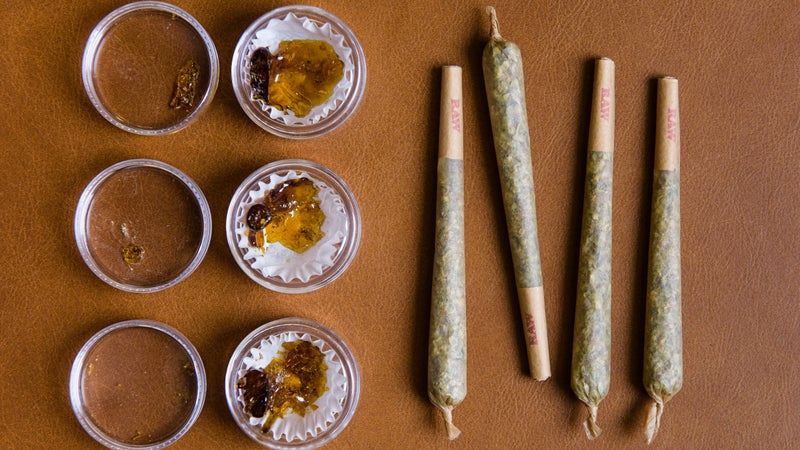
On a late afternoon, Lewis and I got pleasantly buzzed on Durban Poison, an energizing, citrusy sativa from South Africa, and took a hike above Aspen. Lewis talked about his kids. “There’s nothing to hide,” he said. “I’ve always told them, ‘Daddy’s building a farm. We’re growing plants for grown-up medicine there.’ ” He chuckled. “Mason came home from kindergarten one day with a when-I-grow-up thing that said, ‘I want to sell medicine like my daddy.’ I asked Liz, ‘Did the teacher hand this to you with a straight face?’ ”
I listened intently. My eyes felt wide open and focused. My heart beat a little faster than normal. The gold aspen leaves were stunning. Really stunning. Had Lewis brought any snacks?
“I became a vegetarian when I was 12 years old,” Lewis continued, apropos of nothing. “If you ask me why, I’ll tell you that I had a sincere interest in animals. Not that I have any moral high ground: I use leather and don’t necessarily think hunting is bad. Anyway, I went off to college and everyone’s a vegetarian! I wouldn’t talk about it. I didn’t want to be part of that whole thing. I feel that way about marijuana now. It’s getting a little mainstream.” He laughed, acknowledging how that sounded coming from a cannabis entrepreneur. “My original interest in it wasn’t driven by what was cool or what made money. That’s where the opportunity is now obviously. But it was originally about something else.”
He paused and asked me, “How are you feeling?”
“Like I should move to Colorado.”
We walked a few minutes in silence.
“What would have happened,” he said, “if I’d gotten the New York hospital deal? I would have been the proverbial dog that caught the truck or the train or whatever. Then what? My family is here. I’m miserable in New York. I love Colorado. I love hiking and skiing.
“I’m an entrepreneur,” he continued. “And at the end of the day, this is going to be a fantastically big and deep market across the country. The low-hanging fruit are sleep and pain remedies. I have an infused product in the works; we just have to make it acceptable to the medical community and reliable for patients. I don’t think anyone has taken it to that level, although a lot of smart people are trying.”
He packed the pipe one more time and said, “I think I’ll be the one to do it.”
He was high, and so was I, but it seemed plausible. Then we floated down to the trailhead. I went back to my hotel and began to pack. I couldn’t fly home with what I hadn’t smoked, so I left a gram for the maid at the Viceroy and another with the valet, who accepted it with a knowing smile. I gave the last to a drifter sitting at the intersection of Owl Creek Road and Highway 82. He opened up the little green bottle and took a long, deep whiff. “Good shit,” he said.
Charles Bethea () wrote about the Japanese ritual of misogi in January 2015. He lives in Atlanta.


